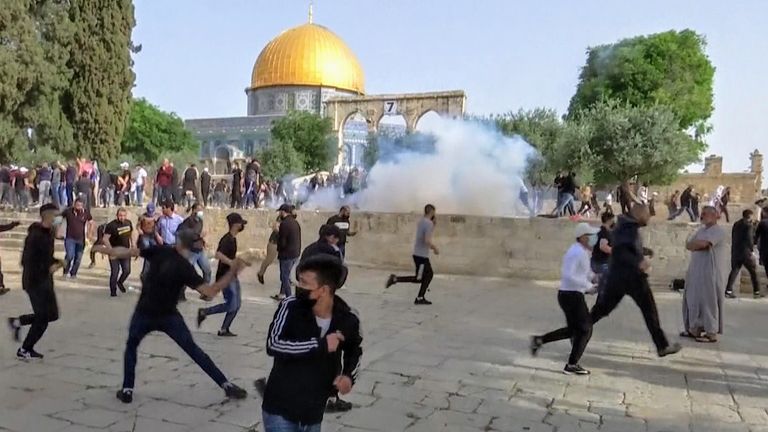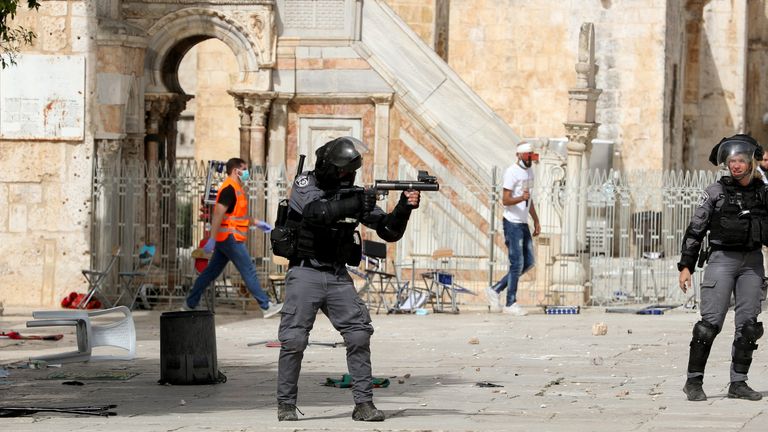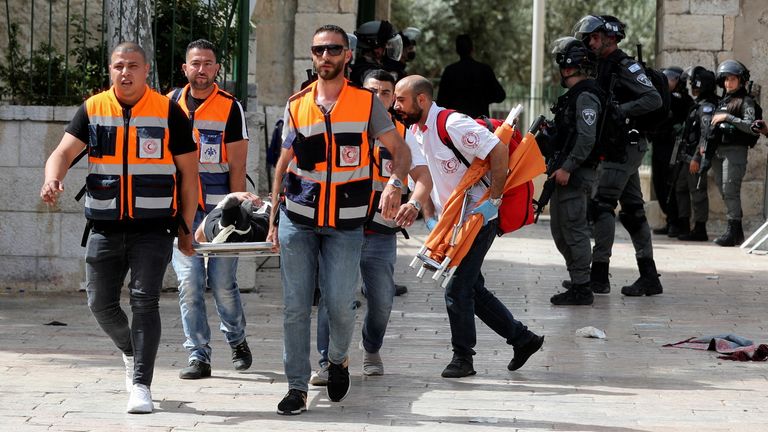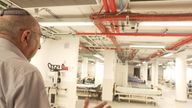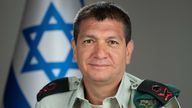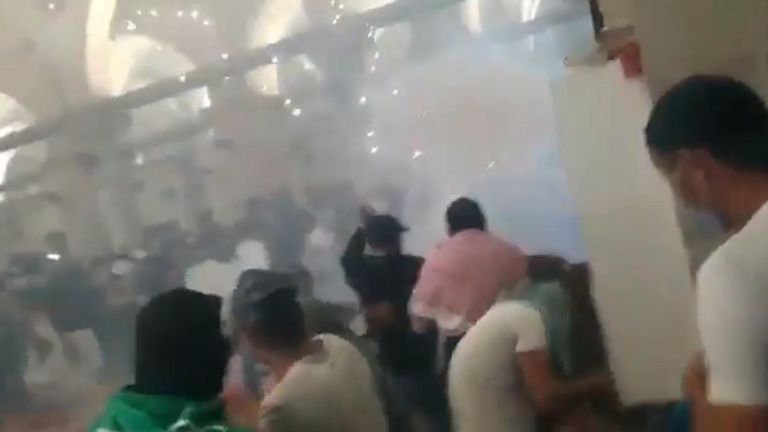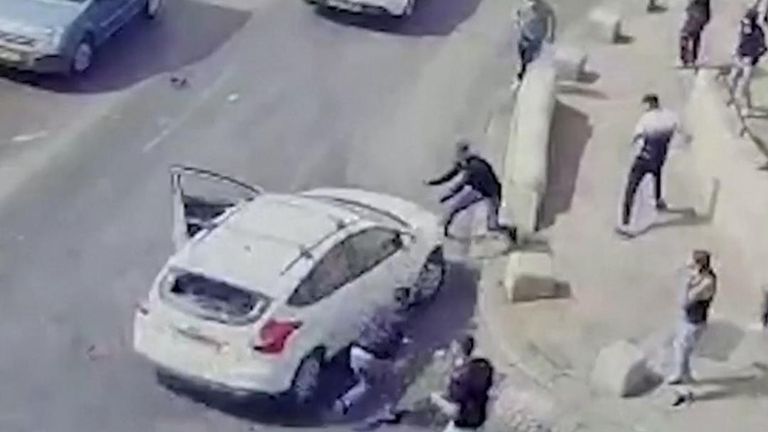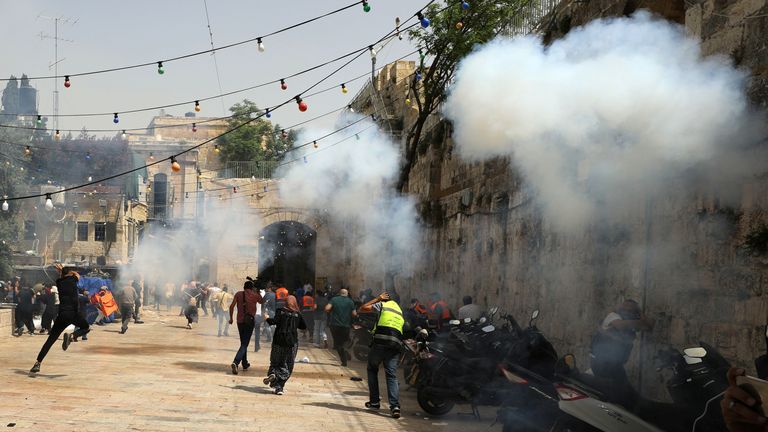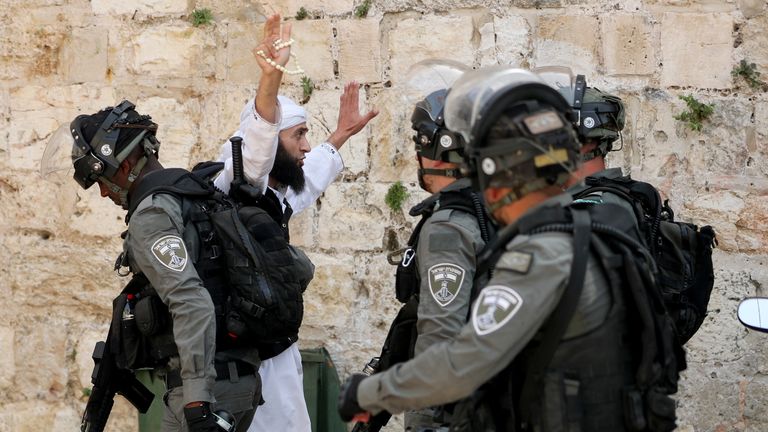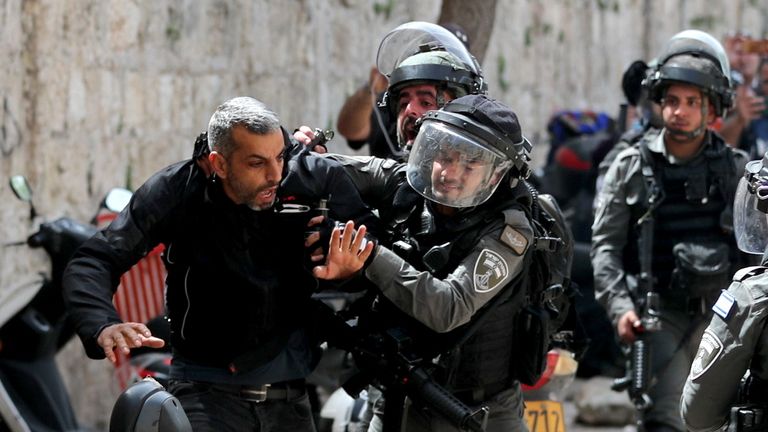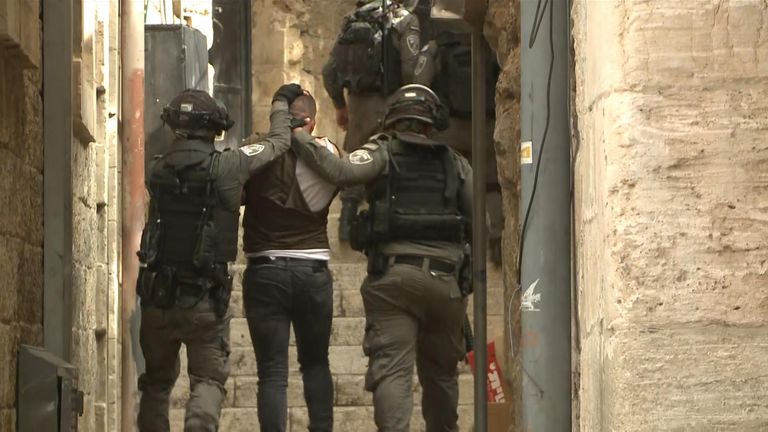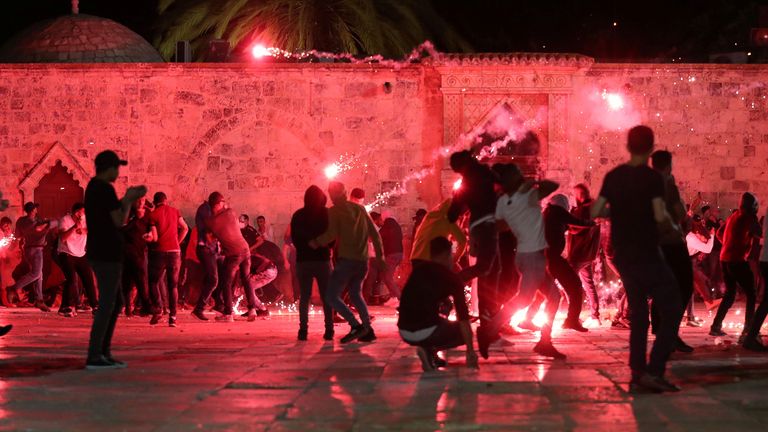Israel: Nationalist march re-routed in Jerusalem following clashes that saw more than 300 hurt
Palestinians said stun grenades were fired into the Al Aqsa mosque compound, leaving at least 305 hurt, according to reports.
Monday 10 May 2021 17:13, UK
Israeli police have changed the route of a contentious march by Jewish ultranationalists in Jerusalem, following clashes that saw more than 300 people injured.
The original route had planned to go through Damascus Gate and into the Muslim Quarter of the Old City.
But the march, in honour of Jerusalem day, has been changed to avoid that area due to heightened tensions following clashes between Israeli police and Muslim worshippers.
The Palestinian Red Crescent Society said more than 305 Palestinian worshippers were injured and at least 228 taken to hospital following violence at the Al Aqsa mosque compound this morning.
Seven people are said to be in critical condition and police said 21 officers were injured.
An Associated Press photographer who witnessed the confrontation said that some worshippers had barricaded gates to the compound with wooden boards and scrap metal when the violence erupted around 7am local time.
Officers fired tear gas and stun grenades, some of them landing inside the compound itself, where around 400 people reportedly were.
Authorities said worshippers threw stones and other objects at police and on to an adjoining road where thousands of Israeli Jews had gathered to pray.
There is a debate about who started this morning's violence.
Ofir Gendelman, a spokesman for Israel's Prime Minister Benjamin Netanyahu, claimed in a tweet that "extremist Palestinians planned well in advance to carry out riots" at the holy site.
He added that Israel guarantees freedom of worship, but "not the freedom to riot and attack innocent people".
Meanwhile, Nabil Abu Rudeineh, a spokesman for Palestinian President Mahmoud Abbas, accused "Israeli occupation forces" of conducting a "brutal raid" at Al Aqsa.
In other violence, Palestinian protesters hurled rocks at an Israeli vehicle driving just outside the Old City walls.
The driver appeared to lose control and slammed into a bystander. Police said two passengers were hurt.
Hundreds of Palestinians and about two dozen police officers have been injured in similar incidents over the last few days.
The Al Aqsa mosque compound, known to Jews as the Temple Mount and to Muslims as the Noble Sanctuary, is considered the holiest site in Judaism and the third holiest in Islam.
It has been centre stage for Israel-Palestinian violence in the past.
Tensions in the city are particularly high as Israel marks Jerusalem Day on Monday - its annual celebration of the capture of East Jerusalem, and the walled Old City that is home to Muslim, Jewish and Christian holy places, in a 1967 war.
Police barred Jews from visiting the Al Aqsa compound to mark the day in an effort to dial down tensions.
They said the decision to re-route the traditional Jerusalem Day march to the Western Wall in the Jewish Quarter had come at the direction of the country's political leaders.
This year the march coincides with the Muslim holy month of Ramadan - a time of heightened religious sensitivities.
Addressing a special cabinet meeting ahead of Jerusalem Day, Mr Netanyahu said on Sunday that Israel "will not allow any extremists to destabilise the calm in Jerusalem".
"We will enforce law and order decisively and responsibly," he said.
"We will continue to maintain freedom of worship for all faiths, but we will not allow violent disturbances."
At the same time, he added: "We emphatically reject the pressures not to build in Jerusalem."
The UK has appealed for calm in light of the violence on Monday morning.
James Cleverly, minister for the Middle East and North Africa, said in a statement: "The UK appeals for calm, and calls for an end to the violence witnessed in Jerusalem over recent days.
"All sides need to de-escalate tensions in the final days of Ramadan."
The US, meanwhile, has reiterated its "serious concerns" about the situation.
Washington made these known during a phone call between national security advisor Jake Sullivan and his Israeli counterpart.
Mr Sullivan urged Israel "to pursue appropriate measures to ensure calm during Jerusalem Day commemorations", according to a statement by National Security Council spokeswoman Emily Horne.
The UN Security Council has scheduled closed consultations on the situation. Diplomats said the meeting was requested by Tunisia, the Arab representative on the council.
Tensions have soared in recent weeks in east Jerusalem, which is claimed by both Israel and the Palestinians.
At the beginning of the Muslim holy month of Ramadan, Israel blocked off a popular gathering spot where Palestinians traditionally socialise at the end of their day-long fast.
The move set off two weeks of violent incidents before Israel lifted the restrictions.
In recent days, violence has resumed after Israel threatened to evict dozens of Palestinians in the Sheikh Jarrah neighbourhood in east Jerusalem.
Situation in Jerusalem has all the worrying elements of a third intifada
Analysis by Mark Stone, news correspondent in Jerusalem
There are a number of reasons why the situation has spiralled over the past few weeks. A decision, by the Israeli police, at the start of Ramadan to barricade the seating area outside the Damascus Gate caused initial tension and forced a U-turn by the police commander.
Ramadan this year comes during a fierce heatwave in a pandemic in which Palestinians have been disproportionally hit. But it runs much deeper than that.
Israeli hard-line nationalism has been emboldened by politicians desperate to hold on to power. Israeli settlement expansion in the Palestinian West Bank is happening at unprecedented levels.
Then there is the issue of Sheikh Jarrah, the East Jerusalem neighbourhood where Palestinian families are fighting a court battle with Jewish settlers who want to take their homes, claiming the land is historically theirs.
Backed by powerful Jewish lobbies and an Israeli court, the settlers have demanded the Palestinians leave the land because it was owned by a Jewish religious association before 1948. A 1970 Israeli law allows Jews to reclaim land and property in East Jerusalem but no equivalent law exists for Palestinians whose land has been taken by Israelis since the State of Israel's formation in 1948.
Israel captured East Jerusalem from the Jordanians in 1967 and annexed it as their own, but most of the international community considers it to be occupied land and the attempted seizures part of a process to systematically change the demographics of the city in favour of Jews. The issue and the current tension in Sheikh Jarrah goes to the heart of the conflict.
Today is Jerusalem Day - marking the moment in 1967 when Israel took control of the city. Hundreds of nationalist Israelis will march, flags in hand, through the Old City and its Muslim quarter. It is a show of patriotism for them, but it's a provocation for the Palestinians.
The Israeli nationalists were to be given access to what they call Temple Mount - the holiest site in Judaism which, because of the layered history here, is also the site of the Al Aqsa mosque, Islam's third most revered site. However, in an early morning decision, the Israeli authorities decided not to allow Jewish access to the site - but the old city march will go ahead.
On Friday, the courtyard outside the mosque was the scene of very troubling confrontations between police and Palestinians who resented their presence there. At one point Israeli stun grenades ended up inside the mosque itself.
The tension has spread to Gaza, where the militant Hamas organisation, in "solidarity with their brothers in Jerusalem", has fired rockets into southern Israel.
The Israeli-Palestinian conflict is decades old. Generations of stubborn politicians on both sides have been unable to resolve it. Generations of diplomats from around the world have arrived presuming they could do what others before them could not. A decade of relative calm in the region has created a mirage of a situation that can be "managed".
But the past month of tension is a reminder that management just obscures the reality.
The first and second bloody intifadas (Palestinian uprisings) started like this. There is talk now of the prospect of a third. It's in almost no one's interests and so calm will hopefully be restored soon. But the worrying elements are all there.
